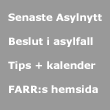ASYLNYTT
Sponsrad av Fridh Advokatbyrå
ARKIV:
EU:s flykting- och gränspolitik
Allmänt om migration, statistik

Asylnytt - Arkiv
Flyktinggrupper från olika länder, praxis
Mali
Information från myndigheter och organisationer
Pressklipp saknas
Arkiveringsdatum 190826:
UNHCR 19-08-09:
Från Mali/ Amidst escalating violence in Mali, UNHCR issues new protection guidelines
In light of the deteriorating humanitarian and security situation, UNHCR, the UN Refugee Agency is urging States to provide protection to people fleeing conflict-affected areas in Mali.
While not all Malians may be in need of international protection, many from the northern region (Timbuktu, Gao, Kidal, Taoudenni and Menaka), central region (Mopti), some parts of the southern region (Koulikoro, Ségou and Sikasso) and border areas with Niger and Burkina Faso are likely to need asylum.
Persistent violence amongst armed groups and inter-communal clashes continue to affect northern Mali, and have now spread to other regions. Some armed groups affiliated with Coordination des mouvements de l'Azawad (CMA) and the Platform, a loose coalition of militias, have failed to respect the 2015 Peace and Reconciliation in Mali agreement. The conflict has been further escalated by Islamist extremist groups.
The ongoing insecurity has weakened the authority of state institutions in some parts of the country, particularly in the northern and central regions. Civilians, politicians and civil servants and security forces are being targeted and killed. Nearly 200 peacekeepers have been killed since 2013, making it the deadliest peacekeeping operation in the world. People who collaborate with national or international defence forces subsequently find themselves targeted for attack.
Local populations, particularly in the central regions, report widespread human rights violations including summary execution, disappearances, torture and arbitrary arrest. Smugglers and traffickers are able to operate with impunity.
The crisis has had a devastating and disproportionate effect on children. Children are being forcibly recruited by armed groups, kidnapped and killed. More than 285,000 children are being denied an education due to school closures, predominantly in the Mopti region. Girls are being raped and sexually assaulted.
(...)
Läs mer (Extern länk)
Källor: Informationen på denna sida är hämtad från följande källor (externa länkar): EU (kommissionen, ministerrådet, parlamentet och domstolen), Europarådet (mr-kommissionären, domstolen, kommittén mot tortyr), FN:s flyktingkommissariat UNHCR, FN:s kommitté mot tortyr m.fl. FN-organ, Sveriges Radio, SvT, andra svenska media via Nyhetsfilter och pressmeddelanden via Newsdesk, utländska media till exempel via Are You Syrious och Rights in Exile, internationella organisationer som Amnesty International, Human Rights Watch, ECRE, Statewatch och Picum, organisationer i Sverige som Rädda Barnen, Asylrättscentrum, Svenska Amnesty, FARR och #vistårinteut samt myndigheter och politiska organ som Migrationsverket, Sveriges domstolar, JO, Justitiedepartementet m.fl. departement och Sveriges Riksdag.
Bevakning: Hjalte Lagercrantz och Sanna Vestin. Sammanställning: Sanna Vestin. Asylnytt är ett ideellt projekt. Sponsring avser prenumerationsavgifter. Tips emottages tacksamt.

 innehåll
innehåll